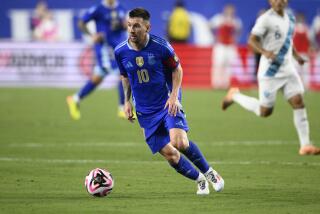Don’t look for beautiful games from Brazil
- Share via
Here are five things for South African fans to remember when they flock to stadiums in Johannesburg and Durban next month to watch Brazil play in the World Cup:
• This will not be the winning Brazil team of 1958, when a 17-year-old named Pele lit up Sweden with six goals in four games.
• This will not be the winning Brazil team of 1962, when Garrincha, the “little bird” on the wing, dazzled everyone with his dribbling and his goals.
• This will not be the winning Brazil team of 1970, when the cast of magicians in yellow and blue included Pele, Jairzinho, Gerson, Carlos Alberto, Clodoaldo, Rivelino and Tostao.
• This will not be the winning Brazil team of 1994, when Romario and Bebeto “rocked the baby” in their goal celebrations.
• This will not even be the winning Brazil team of 2002, when Ronaldinho’s audaciousness, Ronaldo’s goals and the wingback play of Cafu and Roberto Carlos enthralled everyone.
But it could be the winning team, again.
In fact, it will be a major surprise if Coach Dunga’s Brazil squad is not on the podium July 11 at the Soccer City Stadium receiving the World Cup trophy for the sixth time.
There are other challengers, notably Argentina, Spain, Germany, England, Italy, the Netherlands and, yes, even France, but it is the Brazilians, ranked No. 1 in the world, who bring the real pedigree.
The trouble, however, is that they are not likely to bring the flair, the excitement, the unpredictability, the inventiveness, the passion and the creativity that fans of the Selecao have come to expect.
Dunga has seen to that. He will make sure of it Tuesday when he announces his preliminary roster for the South African adventure. If it does not include Ronaldinho — and it probably will not — Brazil in 2010 will be all about winning and not about entertaining.
Ronaldinho, 30, has done everything but beg to be on the team. This is what he told the Italian gossip magazine Chi last month: “Recently, I have had problems with the national team, but it hasn’t been my fault,” he said. “I can’t imagine a World Cup without Ronaldinho on the field. It seems impossible to me when I think of not playing.”
It doesn’t seem impossible to Dunga, the no-nonsense defensive midfielder from Brazil’s triumphant 1994 side who is now his country’s 46-year-old no-nonsense coach. Ronaldinho, a two-time FIFA world player of the year, has not stepped on the field for Brazil since April 2009, when he made his 87th and very likely final appearance.
“You [the media] always want big-name players,” Dunga said earlier this year. “But for us there is no such thing as a big name or a small name. We can’t create problems for ourselves.”
The message — that the team takes precedence — was reinforced when Dunga left Ronaldinho off the squad for a warmup match against Ireland in March. “Pele was once the best player in the world,” Dunga said at the time. “I played well once as well. Players come and players go.”
Ronaldinho’s time, it appears, has gone.
Personality has given way to performance. The artistry that was once the hallmark of Brazil is now secondary. Dunga claims that Brazilian supporters are willing to accept that as the price for winning.
“The fans are buying into our philosophy because the results are there,” he said of the team’s more controlled style of play, its emphasis on counter-attacking soccer and its pursuit of goals off free kicks and corner kicks.
The approach has succeeded for Dunga, who in South Africa hopes to become only the third man to win the World Cup as a player and then as a coach.
Brazil qualified in first place from South America, compiling a 9-2-7 record and defeating both Argentina in Argentina and Uruguay in Uruguay while doing so. It scored the most goals, 33, and allowed the fewest, 11.
It also won the Copa America in Venezuela in 2007 and the Confederations Cup in South Africa in 2009 and has beaten powers England and Italy in friendly competition.
“We have spent 3 1/2 years building this team and almost everything is clear to us,” Dunga said in March. “We have a good team with motivation. There is no reason not to be happy.”
It is not the Brazil many people know. But Dunga could perhaps be thinking back to 1982, when Brazil fielded one of its most attractive and entertaining teams but failed to win the World Cup.
In that Spanish summer, the team included the likes of Zico, Socrates, Junior and Falcao, a dazzling array of talent, but it fell to eventual winner Italy in the second round.
Zico’s words, spoken years later, still echo.
“I am happy to have been part of a team like that,” he told FIFA.com. “People everywhere still remember us. But what matters most to a professional is the title.”
That’s what Dunga believes, and he is counting on his players to deliver. He has a dependable goalkeeper in Julio Cesar, a trio of top-class defenders in Maicon, Lucio and Juan; an elegant midfielder in Kaka, the creative brain of the team, and a pair of forwards in Robinho and Luis Fabiano to provide the goals.
Brazil will be formidable. Enjoyable is another matter.
More to Read
Go beyond the scoreboard
Get the latest on L.A.'s teams in the daily Sports Report newsletter.
You may occasionally receive promotional content from the Los Angeles Times.






